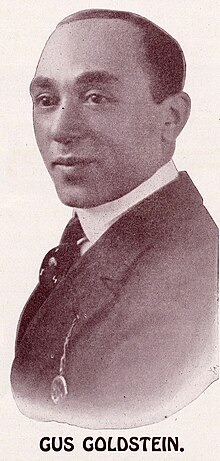Gustave "Gus" Goldstein (Yiddish: גוסטאַװ גאָלדשטײן, c. 1882 – February 19, 1946) was a Romanian-born American Yiddish theatre actor, songwriter, vaudevillian, and recording artist.[1][2] During the boom in Yiddish music recording in the 1910s and 1920s, he recorded dozens of 78-rpm discs of comedy and theatre music for Victor, Brunswick, Emerson, OKeh, and Columbia Records, collaborating with many celebrities of contemporary Jewish music such as Naftule Brandwein, Abe Schwartz, Louis Gilrod, and Clara Gold.[3][4]
Gus Goldstein | |
|---|---|
גוסטאַװ גאָלדשטײן | |
 | |
| Born | Gustave Goldstein June 1, 1882 Iași, Romania |
| Died | February 19, 1946 (aged 63) New York |
| Occupations |
|
Biography
editGoldstein was born in Iași, Romania on June 1, 1882 (although the Leksikon fun yidishn teater gives the year as 1884).[5][1][6][7] His father, Iancu Leib Goldstein, was a house painter, and his mother was named Rebecca (Rifke) Rappaport.[1][8] Gustave showed an interest in performance and songwriting from a young age, and joined an amateur Yiddish theatre troupe at thirteen.[1] At age fifteen he ran away to Czernowitz (today Chernivtsi in Ukraine) where he supported himself by singing his own compositions in taverns.[1] He then left for Paris, where he performed on the Yiddish stage for a time.[1] He emigrated to New York City, arriving in December 1902.[5] He began to appear on Yiddish vaudeville stages there as well as in Yiddish theatre troupes.[1] In March 1904 he was married to Yetta Plevner, a fellow Romanian Jewish immigrant.[8]
He continued to write his own songs, couplets and skits, many of which were recorded during the boom in Yiddish-language recording of the 1910s.[9][1][10] His earliest recordings seem to have been with Victor Records in early 1916; over the next decade he would record at least 70 sides with them, some with other Yiddish comedy figures such as Clara Gold or Anna Hoffman.[3][4] These consisted of comedic skits, Yiddish theatre music, or imitations of scenes from Eastern European Jewish life involving Badchens and klezmers. His recurring characters Yente and Mendel were featured on many of the discs.[4] His discs sold so well that he recorded for most of the major labels in the New York area. As early as 1917 he also started recording for Columbia Records, often with Clara Gold; that contract seems to have lasted until around 1923.[3] In 1919–20 he recorded for Emerson Records's International division.[4][11] In 1922 and 1923 he recorded another set of roughly 20 discs for Okeh Records.[3][12] His final round of recording seems to have a handful of discs been for Brunswick Records in 1927 and 1928, including some records with Alexander Olshanetsky's orchestra.[13][4][3] He was also involved in the business side of the record industry; he was assistant manager of foreign language content at Emerson Records in 1920 as well as at Cardinal Records in 1921.[14][15]
After the collapse of the ethnic recording industry at the end of the 1920s, he returned to Yiddish vaudeville and worked as a singer and comedian during 1930s.
References
edit- ^ a b c d e f g h Zylbercweig, Zalmen; Mestel, Jacob (1931). Leḳsiḳon fun Yidishn ṭeaṭer vol 1 (in Yiddish). New York: Elisheva. pp. 377–8.
- ^ Heskes, Irene (1992). Yiddish American popular songs, 1895 to 1950 : a catalog based on the Lawrence Marwick roster of copyright entries. Washington, D.C.: Library of Congress. p. xxxv. hdl:2027/pur1.32754061504415. ISBN 9780844407456.
- ^ a b c d e "Goldstein, Gus". Discography of American Historical Recordings. Retrieved 19 May 2022.
- ^ a b c d e Spottswood, Richard K. (1990). Ethnic music on records : a discography of ethnic recordings produced in the United States, 1893 to 1942. Urbana: University of Illinois Press. pp. 1345–81. ISBN 9780252017216.
- ^ a b "Gustav Goldstein. Migration • New York, County Naturalization Records, 1791-1980". FamilySearch. Retrieved 18 May 2022.
- ^ "Gustave Goldstein discovered in U.S., World War I Draft Registration Cards, 1917-1918". Ancestry.com. Retrieved 17 May 2022.
- ^ "Gustave Goldstein discovered in U.S., World War II Draft Registration Cards, 1942". Ancestry.com. Retrieved 17 May 2022.
- ^ a b "Gus & Yetta marriage license". Ancestry. Retrieved 19 May 2022.
- ^ Sapoznik, Henry (2006). Klezmer! : Jewish music from Old World to our world (2nd ed.). New York: Schirmer Trade Books. pp. 79–82. ISBN 0825673240.
- ^ Yablokoff, Herman (1968). Arum der ṿelṭ miṭ Yidish ṭeaṭer oyṭobiografishe iberlebungen un ṭeaṭer-dertseylungen in loyf fun a halbn yorhunderṭ Yidishe un ṿelṭlekhe geshe'enishn (in Yiddish). New York. p. 625.
{{cite book}}: CS1 maint: location missing publisher (link) - ^ "ADVANCE RECORD BULLETINS FOR MAY". Talking Machine World. No. XVI No. 1. New York: Edward Lyman Bill, Inc. 15 April 1920. p. 244.
- ^ Laird, Ross (2004). Discography of OKeh Records, 1918-1934. Westport, Conn.: Praeger. pp. 188–235. ISBN 0313311420.
- ^ Laird, Ross (2001). Brunswick records : a discography of recordings, 1916-1931. Westport, Conn.: Greenwood Press. p. 457. ISBN 9780313318672.
- ^ "EMERSON INTERNATIONAL CHANGES". Talking Machine World. No. 8. New York: Edward Lyman Bill, inc. 15 November 1919. p. 105.
- ^ "GUS GOLDSTEIN WITH CARDINAL CO". Talking Machine World. No. XVII no.4. New York: Edward Lyman Bill, Inc. 15 April 1921. p. 162.
- ^ "Gustave Goldstein discovered in U.S., Social Security Applications and Claims Index, 1936-2007". Ancestry.com. Retrieved 17 May 2022.
- ^ "Gustave Goldstein discovered in New York, U.S., State Census, 1905". Ancestry.com. Retrieved 17 May 2022.
External links
edit- Gus Goldstein handwritten scores in the Library of Congress digital collection
- Gus Goldstein recordings in the Mayrent Collection at University of Wisconsin–Madison
- Gus Goldstein recordings in the Recorded Sound Archive at Florida Atlantic University